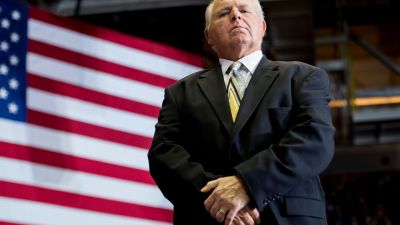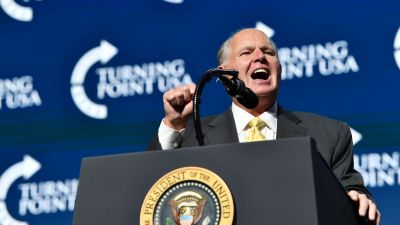“The longest-running show on television” is how NBC’s weekly Sunday morning political program Meet the Press bills itself. In this case, longevity might be proof of innocuousness. For years, under the stewardship of Lawrence Spivak, who had the personality of a high school shop teacher, the show was a press conference of the pre-Trump variety — low-key, staid, formal, non-confrontational. But over the years, Meet the Press and its clones on CBS, Face the Nation, and ABC, This Week, not to mention the knockoffs on cable, have gained importance out of proportion to their relatively meager ratings. This is in part because they are the place for politicians to spin, and in part because that spin is amplified by sound bites on the evening news, in newspapers and on the radio. You could almost say that the debate starts here, which was the case this past Sunday on the GOP’s new health care — or health I-couldn’t-care-less — plan. More, these shows help define the quality of the debate.
With that in mind, on Sunday I watched the two most venerable of these shows, Meet the Press and Face the Nation. Long ago Meet the Press had morphed from Spivak’s somnambulant show to Tim Russert’s less polite, more hyperactive one. Russert, who died of a heart attack in 2008 after presiding over the program for 16 years, is venerated now, but from his Sunday perch, he damaged political journalism in two ways. First, he indulged a faux populism in the persona of a beefy, working-class galoot from Buffalo who was a chip off Big Russ, his working-class Pop. It was a pose; if Russert were working-class, he was a blue-collar millionaire — and it seemed cleverly designed to play against media elitism, which hurt the media’s credibility even as it boosted Russert’s and the show’s. Second, he created a faux journalism in which catching a politician in a contradiction became an entertaining stunt, one that superseded real probing of ideas and values. In that way, he transformed the Sunday shows.
NBC knew Russert would be a hard act to follow. His first replacement, reporter David Gregory, apparently was too much a sobersides to perform the old Russet parlor tricks. His replacement, Chuck Todd, did better. And to give Todd his due, he wasn’t too bad on Sunday. In fact, sometimes he was quite good.
Yes, he referred to “moderate Republicans,” as if there were such a thing. And, yes, he let Health and Human Services Secretary Tom Price get away with a few whoppers, but not as many as one might have expected, and he even nailed Price down to making the surely erroneous claim that the GOP plan will provide better coverage than Obamacare and do it more cheaply. (This was before the impending Congressional Budget Office report that showed neither of these things was true.)
Now Price is on record. Where Todd fell down on the job was in letting Price get away with the refrain that Obamacare had “failed” (of course Price dare not mention that Republicans had done everything in their power to make it fail), and another refrain that premiums had skyrocketed when, in fact, they hadn’t. Only 3 percent of the insured, according to The New York Times, had seen substantial rises. Todd didn’t say, though he should have, that as premiums rose for all but this 3 percent, subsidies also rose. (This is a perfect case of the squeaky wheel getting the grease and the press.) And he failed to challenge Price on how Medicaid functioned. Price said not well. He is wrong.
Later in the show, Todd interviewed Ohio Gov. John Kasich, who opted for a more robust Medicaid program than the GOP bill provides. (Of course he does: Ohio has 700,000 of its citizens on Medicaid.) Todd was clearly sympathetic to Kasich’s view that any successful reform has to be bipartisan, but he still let Kasich get away with the most tired of conservative clichés — the benefits of a “market-driven system.” Todd didn’t ask the most basic question: If the market had worked so well, why were so many folks before Obamacare uninsured? Indeed, if the market worked so well, why did we need Medicare or Medicaid or SCHIP?
What Todd did do, powerfully, was go to the data. He showed what the impact of the GOP repeal and replace would have in various communities on a 60-year-old who makes $40,000 a year. And remember, the GOP bill is most generous to the elderly, which isn’t to say that it is generous. He found that the biggest losers — that is, the communities that would lose most from the Obamacare repeal — were those that voted for Trump. Either the folks living there have a big surprise coming when they find they can’t afford insurance, or they care more about baiting immigrants and Muslims than they do about their own health. We may be about to find out. In any case, anyone who had doubts about the GOP plan now had more information to make up his or her mind about it.
All in all, not bad.
And compared to Face the Nation, it was like the Lincoln-Douglas debates. That show’s host, John Dickerson, opened with a taped interview with Speaker Ryan that was textbook in how to be spun. Ryan was predictably flannel-mouthed, telling fib after fib with all the earnestness (and deceit) of Leave It to Beaver’s Eddie Haskell: that the GOP had a “much better policy” than Obamacare (just ask the CBO); that the plan had been months in development (yeah, sure); that what Americans want most of all is “more freedom” (apparently freedom from health insurance); and the old standby, that Obamacare is “collapsing.”
Dickerson, calm, reserved, non-confrontational, was also woefully ill-prepared and wildly overmatched, which isn’t easy with Ryan, who is not exactly the sharpest tool in the political shed. “People are missing the historic nature of this,” Ryan avowed, meaning not only the end of Obamacare but also the end of Medicaid as we know it. Dickerson didn’t even provide feeble resistance, like challenging the consequences of Medicaid’s demise. To top it off, when Dickerson brought up Trump’s charges of being wiretapped by former President Obama, Ryan insisted, “There has been a lot of reporting about this,” without Dickerson amending that comment with, “Yes, in Breitbart and the ‘alt-right’ blogs.”
Dickerson returned with more Ryan later in the broadcast, after letting Sen. Rand Paul (R-KY) deliver his own blather. (During the panel segment of the show, Republican adviser Avik Roy, pointed out that Paul, who now fiercely opposes tax credits to help folks pay for their insurance, felt very differently when the credits were being given to the elderly. Why didn’t Dickerson know that?)
Round Two also went to Ryan. When Ryan argued that the CBO is likely to find a large increase in the number of uninsured under his plan (as it did), he gave this cogent reason: because Obamacare had a mandate, and his plan doesn’t. Since he didn’t correct Ryan on this fundamental plank, Dickerson apparently doesn’t understand insurance any better than Ryan does. Of course it has a mandate. That is how you get healthy people to pay for sick people. “We are not going to make people do what they don’t want to do,” Ryan asserted, without any pushback from Dickerson about that being the only way you can insure the sick and elderly. Finally, when Ryan delivered his coup de grâce, that Republicans never said they would insure everyone, only that they would assure “universal access” to coverage, Dickerson didn’t fire back: Everyone already has access to health insurance. It is the means to pay for it that they don’t have.
I won’t belabor Face the Nation’s journalistic panel, except to say that when Peter Baker of The New York Times repeats the tired cliché that Ryan is “wonky and smart,” we just saw evidence that he was neither; and to say that Avik Roy acquitted himself again when he blew the whistle on his fellow Republicans by admitting many of them never believed in Medicaid in the first place.
So this is how the media debate on health care begins: with dueling talking heads on Sunday morning. What it demonstrates is that if we are going to have a serious conversation, the media better be up to the task. They need to know their stuff. They need to be willing to challenge obviously false assertions. They need to correct the spin. Dickerson seems to think doing so would be a violation of objectivity, which is the standard operating procedure of television news. Don’t talk back. Todd, at least, wasn’t going to play nice. That is a beginning.




